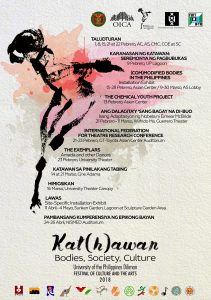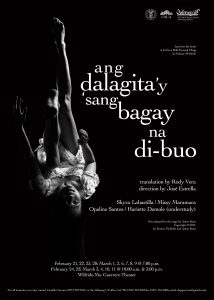 (FEB.2)—The Filipino body—what it is, how it is perceived and shaped by art, culture and society and manipulated by social engineering and advertising: these are the themes of Kat(h)awan, the 3-month Festival of Culture and the Arts at UP Diliman.
(FEB.2)—The Filipino body—what it is, how it is perceived and shaped by art, culture and society and manipulated by social engineering and advertising: these are the themes of Kat(h)awan, the 3-month Festival of Culture and the Arts at UP Diliman.
The festival seeks to understand the Filipino body as a creative realm and a locus of scholarly discourse, taking the cue from sociologist Bryan S. Turner, a professor at Potsdam University in the United Kingdom who has devoted significant attention to the sociology of the body, and Zheng Yangwen, Professor of History at the University of Manchester and author of several books on China and Asia.
The festival opens in February with 12 major events comprising performances, conferences, two installation exhibits and film showings, among others.
 Ushering in the festival is Tuludturan: Poesia ng Katawan, a 4-part public 10-minute performance project including dance, movement and performance pieces. Drawing from “taludturan,” meaning stanza, specifically of a poem, the performances explore the embodiment of the encounter and engagement with beauty, love, desire, revolt and death.
Ushering in the festival is Tuludturan: Poesia ng Katawan, a 4-part public 10-minute performance project including dance, movement and performance pieces. Drawing from “taludturan,” meaning stanza, specifically of a poem, the performances explore the embodiment of the encounter and engagement with beauty, love, desire, revolt and death.
On Feb. 1, 8 and 15, performances will be staged at 3 p.m. in the lobbies of Palma Hall, Melchor Hall, Plaridel Hall and the UP Shopping Center. On Feb. 21 and 22, the performances will be at 1:30 p.m. at the Asian Center.
The festival formally opens with a celebration of the body in Philippine pop culture in Seremonya ng Pagbubukas: Karanasan ng Kat(h)awan, to be staged on Feb. 9 at 6 p.m. at the UP Lagoon.
Highlighting the experience of the body as an object of pleasure and desire, the ceremony features Rochelle Pangilinan of the SexBomb Girls, the Masculados Dos, Kare Adea, Dzeli Del Mundo and Orlando Orbiana. The program likewise features encounters of the masculine, queer and feminine gazes popular in songs considered as novelty in Philippine music and a dramatic reading of writer Gilda Cordero-Fernando’s works.
 (Com)modified Bodies in the Philippines, an installation exhibit on the commodification of the body and body technologies, opens at the Asian Center on Feb. 13 at 2:30 p.m.
(Com)modified Bodies in the Philippines, an installation exhibit on the commodification of the body and body technologies, opens at the Asian Center on Feb. 13 at 2:30 p.m.
Composed of five galleries and a floor plan resembling a maze, the exhibit traces the history of “the beautiful” in the Philippines, the mundane rituals of everyday life, the body modifications in the country and documentary films on body technologies.
The exhibit is free and open to the public and runs until Feb. 28.
A symposium on The Chemical Youth project follows at 3:30 p.m. at the Asian Center, where findings of the research collaboration between the UPD Department of Anthropology and the University of Amsterdam on body sites and body technologies will be revealed. The ethnographic study was conducted in Batangas, Puerto Princesa, Palawan and Batanes and Cagayan de Oro.
Following the conference is a preview of the documentary “Sweet Medicine.” Filmed by a local camera crew in Palawan, Philippines, it follows the lives of people involved in a multi-level marketing company selling a popular herbal medicine. According to the University of Amsterdam website, the film was produced by Anita Hardon and directed by Juul Op den Kamp and is a cinematic translation of Hardon’s fieldwork in Palawan as part of her Chemical Youth project.
 Ang Dalagita’y ‘sang Bagay na Di-Buo opens at the Wilfrido Ma. Guerrero Theater on Feb. 21.
Ang Dalagita’y ‘sang Bagay na Di-Buo opens at the Wilfrido Ma. Guerrero Theater on Feb. 21.
Staged by Dulaang UP, the play is an adaptation of Eimear McBride’s novel “A Girl is a Half Formed Thing.” Translated by Rody Vera and directed by José Estrella, the play is based on Annie Ryan’s stage adaptation of the acclaimed novel and tells of the tragic life of a Girl, who has been repeatedly abused by her uncle, who loses her brother, grapples with the wicked religiosity of her mother and increasingly finds herself with no options left.
The play runs until Mar. 11 with show times at 7 p.m. from Wednesday to Friday and at 10 a.m. and 3 p.m. on Saturday and Sunday.
The International Federation for Theatre Research Conference will be held from Feb. 21 to 23 at the GT Toyota Auditorium.
With the theme Bodies in/and Asian Theatres, the conference attempts to answer the general questions: what do we mean when we talk about bodies in Asian theatres and performances? What do we mean when we talk about Asian bodies in different performances outside the region? How does theatre affect the way we think about the bodies of Asians?
Conference speakers include academics from the University of California Berkeley, Kyoto University, University of Californa Santa Cruz, University of Melbourne, Osaka University, National University of Singapore, De La Salle University and UP. Also featured are National Artist for Dance Alice Reyes, and representatives from the Asian Dramaturgy Network and Performance Network Philippines.
The event is organized by the Asian Theatre Working Group, International Federation for Theatre Research and various UPD units.
The first staging of Exemplars: Amada and other Dances by Ballet Philippines at UP Diliman will be at 7 p.m. on Feb. 23 at the University Theater.
Amada is based on the short story “Summer Solstice,” also known as “Tatarin,” by National Artist for Literature Nick Joaquin. Set in Catholic, Hispanic 19th century Manila, traditional male dominance is shaken by the Tatarin, a native festival where women suddenly reign supreme, shattering the established Hispanic molds and patterns.
Admission to the ballet is free but control tickets will be issued.
To celebrate Women and Gender Month in March, three events have been lined up.
The first is a film festival comprising works of acclaimed Filipino film directors on women in Katawan sa Pinilakang Tabing.
Himigsikan, the weekend open air concerts at the Carillon Plaza, will also be staged, along with Lawas: Site-Specific Installation Exhibit, featuring renowned visual artists.
Closing the festival in April is the Pambansang Kumperensiya ng Epikong Bayan. Organized in collaboration with Komisyon sa Wikang Filipino and the National Commission in Culture and the Arts, the conference will be held from April 24 to 26 at the NISMED Auditorium in celebration of National Literature Month.
The conference has the theme “Tradisyon, Lipunan, Inobasyon” and seeks to showcase the historical narrative and importance of epics in relation to the formation of national consciousness. It also aims to foster critical thinking on the nature of epics in the country.
Details of the March and April events will be announced later.
For tickets and other inquiries, please call or email the Office for Initiatives in Culture and the Arts (OICA) at 981-8500 loc. 2659 or upd.oica@gmail.com
